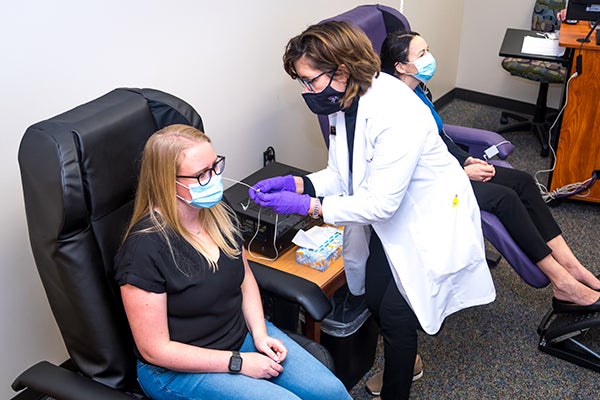COVID-19 RESPONSE
ECU announces new fund to support COVID-19 research and relief efforts
East Carolina University researchers and medical professionals continue to work diligently on the prevention, detection, treatment and long-term impacts of the coronavirus. Dozens of extraordinary projects are underway on the university’s Health Sciences campus, with the goal of getting Pirate Nation, and the region it serves, back to normal.
A new Pandemic Research and Response Fund will provide fast, flexible support for those projects, which range from stopping the spread of infection to expanding treatments to the rural and medically underserved populations across eastern North Carolina. The fund is open to public donations and will further the research started with CARES Act funding received from the North Carolina General Assembly last year. That funding ended in 2020.
“The university has already invested in a number of really great mission-focused research projects at the intersection of pandemic needs and the Brody’s service goals,” said Dr. Pete Schmidt, vice dean of the Brody School of Medicine, who will oversee the allocation of funding. “There were a number of things we were able to understand at the midpoint of the disease that we were not able to complete by the end of the CARES Act funding.”
The projects primarily fall into three categories: treatments to enhance innate immunity to the virus, vaccine development and community testing initiatives. Other projects aim to support high-risk and rural populations in the region and study the long-term effects of the virus. So far, the university has proactively used the existing expertise of its faculty and pivoted or built on research projects to fit COVID-19 needs.
For example, Schmidt has a background in Parkinson’s disease research. He and his colleague Dr. Jeff Eells, associate professor in the Department of Anatomy and Cell Biology, are examining the possibility of Parkinson’s being a long-term complication of the coronavirus. This is based on a study of the 1918 flu pandemic, when many people who caught the flu were diagnosed with Parkinson’s later in life.
“People talk about the ‘fog of covid’ — that could be a sign of a neurological condition that could manifest later in life,” Schmidt said.

Dr. Linda Bolin instructs Amelia Saul on breathing exercises as a machine measures her body’s response to the biofeedback technique. The techniques are used to reduce symptoms and promote healing in patients. (Photo by James Meek)
Other projects happening on the Health Sciences campus include:
- Vaccine development – Dr. Rachel Roper, associate professor in the Department of Microbiology and Immunology, will work to develop a vaccine that targets the whole virus, as opposed to the vaccines that target a small part of the virus that are currently being used. Roper led the team that first sequenced the SARS-CoV-1 coronavirus genome.
- Vaccine distribution – Dr. Paul Bolin, chair of the Department of Internal Medicine, and Dr. Paul Shackelford, professor of obstetrics and gynecology, take COVID-19 vaccines on the road throughout eastern North Carolina using specially equipped vans. This project will directly impact the most rural and underserved areas of the region.
- Saliva-based testing – School of Dental Medicine Dean Dr. Gregory Chadwick, Assistant Dean for Dental Education Dr. Todd Watkins, Associate Professor Dr. Mark Moss, and Brody’s Dr. Rachel Roper explore separate COVID-19 screening projects using saliva (rather than the more invasive nasal swab) for use on campus and in dental clinics and facilities across the state. Dr. Jay Fallon, chair of the Department of Pathology and laboratory medicine, and his team are also performing weekly surveillance saliva testing of students, faculty and staff to help prevent COVID-19 outbreaks on ECU’s East campus.
- Biofeedback monitoring – Dr. Linda Bolin, assistant professor in the College of Nursing, works with undergraduate and graduate students from the College of Health and Human Performance and the College of Allied Health Science to teach patients how to self-monitor at home in order to keep them out of the hospital.
- Surveillance for viral variants – Dr. Fallon recently acquired two state-of-the-art genetic sequencers that will allow ECU researchers in Brody’s Genomics Core Lab to identify COVID-19 variants such as those found in the United Kingdom and South Africa.
Contributions to the Pandemic Research and Response Fund will accelerate these and other existing projects and advance new ones. Funds will be quickly disbursed where they are needed most, helping ECU’s Health Sciences doctors, researchers, faculty and staff do what they do best: keep eastern North Carolinians healthy.
